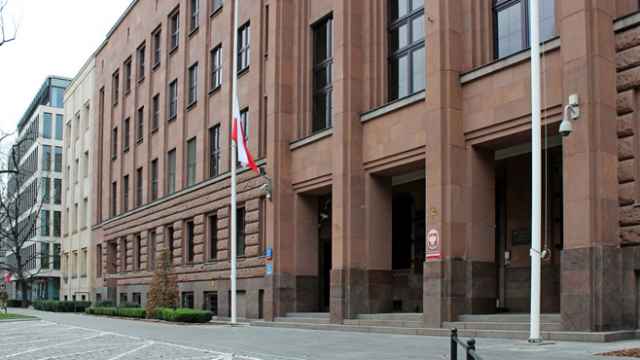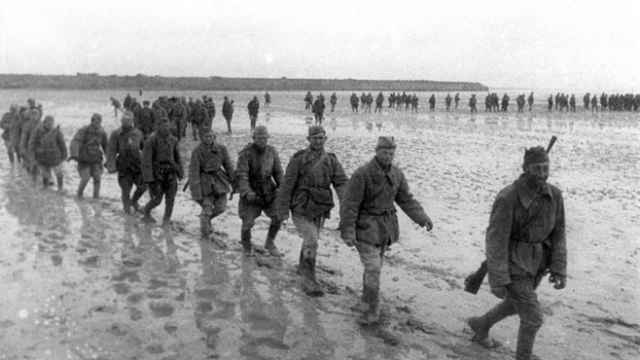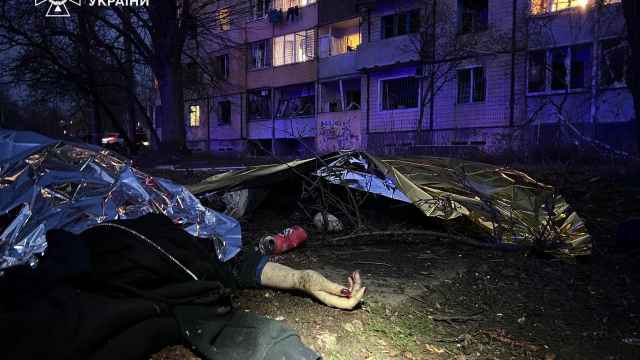WARSAW — Russia's ambassador to Poland has partly backtracked from an accusation that Poland bears some blame for starting World War II because of its policies in the 1930s, words that outraged Poles.
Sergei Andreyev said Monday he had no intention of offending the Polish nation and added: "I regret that I wasn't sufficiently precise." But he also said there had been an "unfair interpretation" of his words.
He spoke to reporters after being summoned to the Foreign Ministry following comments in a TV interview Friday that sparked the uproar.
The diplomatic spat comes amid deep strains in ties between the two Slavic nations over a number of issues, including Poland's support for sanctions on Russia over its actions in Ukraine.
Lately Russia has been making moves to try to emerge from its international isolation, and some analysts in Poland believe that the ambassador's words Friday were meant to elicit a reaction from Polish officials that would make Warsaw appear emotional, anti-Russian and overly focused on the past — thus not a voice to take seriously in international discussions about whether to continue sidelining Moscow.
World War II began after Nazi Germany and the Soviet Union sealed a secret pact in 1939 to divide up Poland and other parts of Eastern Europe. Millions of Polish citizens died in the conflict.
Andreyev on Friday described Soviet actions under dictator Josef Stalin as an act of self-defense, not aggression.
"Polish policy led to the disaster in September 1939, because during the 1930s Poland repeatedly blocked the formation of a coalition against Hitler's Germany. Poland was therefore partly responsible for the disaster which then took place," Andreyev said.
Poland's Foreign Ministry issued a statement of strong protest on Saturday, accusing Andreyev of undermining historical truth, and summoned him for a meeting Monday with a director of the ministry's department on Eastern affairs.
"During the conversation it was noted that these statements are untrue and contrary to the findings of Polish and Russian historians," Foreign Ministry spokesman Marcin Wojciechowski said in a statement.
Andreyev was also reminded that even the Soviet Union eventually condemned the secret Molotov-Ribbentrop pact that carved up Eastern Europe and set the stage for World War II, Wojciechowski said.
The American Jewish Committee denounced the ambassador's original comments as "absurd," noting that the Soviet Union and Germany were allies at that start of the war — until Hitler turned on Stalin in 1941 — and that Poles were murdered by both occupying states.
In his interview on Friday Andreyev said Russian-Polish relations are the worst they have been since 1945, blaming Poland for freezing cultural and political ties. On Monday he said he sticks by that.
In other incidents that have caused tensions, the graves of Soviet soldiers in Poland were recently vandalized and a Polish town dismantled a monument to a Soviet World War II general. Moscow has protested both incidents.
A Message from The Moscow Times:
Dear readers,
We are facing unprecedented challenges. Russia's Prosecutor General's Office has designated The Moscow Times as an "undesirable" organization, criminalizing our work and putting our staff at risk of prosecution. This follows our earlier unjust labeling as a "foreign agent."
These actions are direct attempts to silence independent journalism in Russia. The authorities claim our work "discredits the decisions of the Russian leadership." We see things differently: we strive to provide accurate, unbiased reporting on Russia.
We, the journalists of The Moscow Times, refuse to be silenced. But to continue our work, we need your help.
Your support, no matter how small, makes a world of difference. If you can, please support us monthly starting from just $2. It's quick to set up, and every contribution makes a significant impact.
By supporting The Moscow Times, you're defending open, independent journalism in the face of repression. Thank you for standing with us.
Remind me later.





